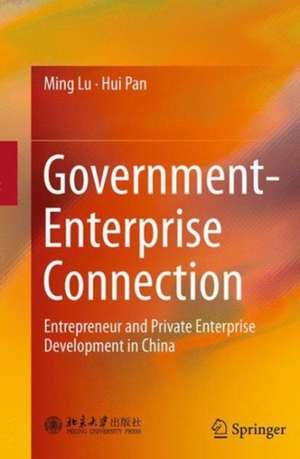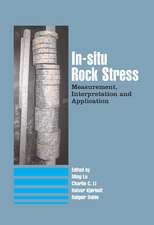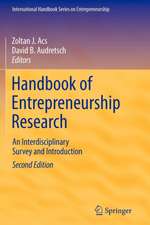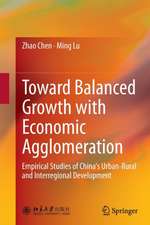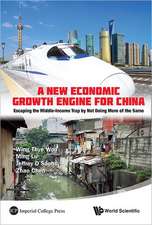Government-Enterprise Connection: Entrepreneur and Private Enterprise Development in China
Autor Ming Lu, Hui Panen Limba Engleză Paperback – 23 aug 2016
- Why and how does China have such special enterprise-entrepreneur-government relationships?
- Do enterprises' political connections in the form of entrepreneurs' political status help improve the performances of these enterprises?
- Which of the surveyed entrepreneurs could become members of the People's Congress and the People's Political Consulting Conference?
- How do entrepreneurs feel when they are faced with greater government intervention?
- How will China move ahead in the ongoing reform and development in the light of the enterprise-entrepreneur-government relationship?
eurs who face interventions from the government also shoulder greater costs in the form of loss of psychological happiness. The inference of this book is that at some point in the foreseeable future, China will gradually build its market system and integrate its domestic markets, so that private enterprises will no longer rely so heavily on their political connections.
| Toate formatele și edițiile | Preț | Express |
|---|---|---|
| Paperback (1) | 381.21 lei 6-8 săpt. | |
| Springer Nature Singapore – 23 aug 2016 | 381.21 lei 6-8 săpt. | |
| Hardback (1) | 388.52 lei 6-8 săpt. | |
| Springer Nature Singapore – 4 noi 2015 | 388.52 lei 6-8 săpt. |
Preț: 381.21 lei
Nou
Puncte Express: 572
Preț estimativ în valută:
72.95€ • 75.73$ • 60.83£
72.95€ • 75.73$ • 60.83£
Carte tipărită la comandă
Livrare economică 22 martie-05 aprilie
Preluare comenzi: 021 569.72.76
Specificații
ISBN-13: 9789811012952
ISBN-10: 9811012954
Pagini: 168
Ilustrații: VI, 168 p.
Dimensiuni: 155 x 235 mm
Greutate: 0.25 kg
Ediția:Softcover reprint of the original 1st ed. 2016
Editura: Springer Nature Singapore
Colecția Springer
Locul publicării:Singapore, Singapore
ISBN-10: 9811012954
Pagini: 168
Ilustrații: VI, 168 p.
Dimensiuni: 155 x 235 mm
Greutate: 0.25 kg
Ediția:Softcover reprint of the original 1st ed. 2016
Editura: Springer Nature Singapore
Colecția Springer
Locul publicării:Singapore, Singapore
Cuprins
Government-Enterprise Connection: Entrepreneur and Private Enterprise Development in China.- Government, Enterprise and Entrepreneur: Are These Relationships the Primary Productive Force?.- Entrepreneur and Enterprise Development: Human Capital, Political Capital and Decision-making Style.- Entrepreneur Political Participation: Building Government-enterprise Connections.- Entrepreneur Satisfaction: What Influence Does Government Intervention Have?.- Present and Future of Government-enterprise Relationship.
Notă biografică
Ming LU is a Distinguished Professor of Economics, the Director of China Centre for Development Studies at Shanghai Jiao Tong University, and a Professor at Fudan University, China. He is also the Research Fellow of Peking University-Lincoln Institute, and Hitotsubashi University, Japan. He worked as a Fulbright Scholar at Harvard University and National Bureau of Economic Research (NBER). He has consulted for the World Bank and Asian Development Bank. His recent research tries to link political economy with economic geography to analyze regional and urban issues. He is also interested in urban labor economics that studies how social interaction and knowledge spillover affect employment and economic growth in the local labor market.
Hui PAN is a Professor and Vice President of Guangxi University of Finance and Economics. She holds Ph.D. in Economics, and worked as Post-doc in both economics and psychology. Her research interests include consumption, management psychology, and private enterprise development.
Hui PAN is a Professor and Vice President of Guangxi University of Finance and Economics. She holds Ph.D. in Economics, and worked as Post-doc in both economics and psychology. Her research interests include consumption, management psychology, and private enterprise development.
Textul de pe ultima copertă
This book is an empirical study on the relationship between private enterprises, entrepreneurs and the government in P. R. China. The two authors conducted a detailed survey of enterprises and entrepreneurs in Liuzhou, Guangxi Zhuang Autonomous Region, China. Although it was only conducted in a medium sized city, the survey provides a rare source of information on matched entrepreneur-enterprise pairs. It provides detailed information on management, performance, enterprise-government relationship, as well as entrepreneurs' personal information and measurements of various psychological parameters. With this first-hand information, the authors analyzed several interesting issues concerning enterprise-entrepreneur-government relationships. Readers will gain an understanding of the following topics:
eurs who face interventions from the government also shoulder greater costs in the form of loss of psychological happiness. The inference of this book is that at some point in the foreseeable future, China will gradually build its market system and integrate its domestic markets, so that private enterprises will no longer rely so heavily on their political connections.
- Why and how does China have such special enterprise-entrepreneur-government relationships?
- Do enterprises' political connections in the form of entrepreneurs' political status help improve the performances of these enterprises?
- Which of the surveyed entrepreneurs could become members of the People's Congress and the People's Political Consulting Conference?
- How do entrepreneurs feel when they are faced with greater government intervention?
- How will China move ahead in the ongoing reform and development in the light of the enterprise-entrepreneur-government relationship?
eurs who face interventions from the government also shoulder greater costs in the form of loss of psychological happiness. The inference of this book is that at some point in the foreseeable future, China will gradually build its market system and integrate its domestic markets, so that private enterprises will no longer rely so heavily on their political connections.
Caracteristici
Presents an in-depth survey of enterprises and entrepreneurs in Liuzhou, Guangxi Zhuang Autonomous Region, China, which offers detailed information about management, performance, enterprise-government relationship, as well as entrepreneurs’ personal information and measurements of various psychological parameters Analyzes the formation of enterprises’ political connection in the form of entrepreneurs’ political status, and how this improves the performances of enterprises at the expenses of entrepreneurs’ happiness and distortions of the market system Forecasts that at some point in the foreseeable future, China will gradually build its market system and integrate its domestic markets, so that the private enterprises will no longer rely so heavily on political connection Includes supplementary material: sn.pub/extras
